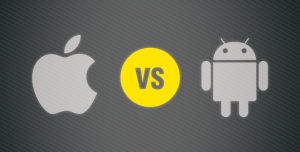This is a frequent question, and the answer unfortunately is not as simple.
Well, everyone has different intentions, goals, and expectations from different devices.
Some require longer talk time – while others will require longer stand by times, and still others have different usage patterns spanning from heavy “social media use” to “email alone”.
Their are those zealots that will argue that one phone/technology is superior than the other. In some respects, each manufacturer has their own strengths and weaknesses, and their points could be valid.
For example, Apple has a few models, with differences ranging from color, size, and performance. Price is usually higher when compared to an Android based solution.
Android, will have many different permutations of color, size, and performance because multiple vendors build Android phones. Your experiences may vary a little more due to the capabilities that are built into the hardware. Some manufacturers are Samsung, LG, Motorola, etc,. Even Google makes their own phone.
In both cases your experiences will be relatively similar across the multitude of devices within either category.
So the final decision – which is better?
Unfortunately, the answer is either or neither.
Huh? Well if you are really dedicated to doing your product research, I also implore you to do a little homework about yourself – FOR yourself.
Create a quick punch list, in the order of priority. Then grade the phones. A simple example could be:
- Battery life
- Integration with music\application Ecosystem ( Apple App Store or Android Play Store)
- Which apps are available for only which device? or is there an overlap?
- Screen size. Along with screen size comes overall device size.
- Expand ability
- “Ease of Use” – which device has the most friendly and intuitive interface
- Carrier availability and coverage
- Ecocycle – For example, do you use all google apps? does your close family need to interact closely with you on the platform? Do you use any 1 platform ( google/apple) more than the other?
- How long do you plan to keep your device? Apple, will support devices for years, but, it depends upon the date the device released. This means that Apple (regardless if your cellular carrier is Verizon or T-Mobile, etc.), will provide software updates (to fix security vulnerabilities, bugs, and introduce some functionality improvements) for a longer period. In the case of Android based devices, the cellular carriers ( Verizon/T-Mobile, etc.) provide the updates (provided by Google). These carriers, generally do not support devices for extended periods of time, and usually end support within 3 years or release date – therefore be careful.
In my experience with both product lines ( but not with every Android device manufactured), I have found that:
- Battery life does vary – but this is more dependent on your conditions and usage patterns. The products are really running a tight race. New products are better on battery life ( generally), but, usage and conditions of usage play a larger roll in your results
- Music? Both Apple and Android have their own flavors of Music and entertainment in their ecosystem.
- Ecosystem integration – again, mostly a level playing field. Most applications are available on both platforms – but not 100%. Hint: If you need a specific “productivity” application or similar, just check.
- Screen size – varies slightly. Same with density.
- Android generally has the expandability option. To my knowledge, Apple does not support the ability to expand via pluggable cards or similar products. This is now becoming an extinct argument because both products will support cloud extensions. With faster internet speeds, and higher caps on data usage, expandability is losing it’s appeal.
- Ease of use – personal choice – Physical feel and size. Do you like a “notch”, or do you prefer rounded bezel?
- Carrier – it is important to find the “right” carrier for your use cases. For example, I had a good carrier for one location, but, the carrier was horrible in other geographical locations. This is independent of the Apple vs. Android war, but, it does play into the decision process as some carriers do not carry ALL lines of all phones. Also carriers will sometimes be late adopters of some devices.
Ultimately, the Apple vs. Android war will not be easily solved.
My suggestion – Pick one device up, play with it, use it, try to perform some of the tasks you would expect to perform. Now, try the next device. Each person will take notice of different minor differences. I had worked with one individual, who took notice of the smoothness of one of the cases. Another didn’t like the shiny chrome – felt it was distracting.
When in doubt to “which is the right phone” – try one last tactic. Ask about a refund window. In most states, the seller will give you the opportunity to reverse your decision without full loss of investment. You may be taxed with an “open box” fee – but, at least it’s better than the full loss. It doesn’t hurt to ask. You may also ask if the “seller” receives a commission or related compensation based on product sales. This will help you determine the quality of the feedback that you will be receiving from the seller.

